Rami Malek hits back at criticism that ‘Bohemian Rhapsody’ straight-washes Freddie Mercury
In our exclusive interview, the actor says the Queen frontman's sexuality is referenced in the biopic
By Steve Brown
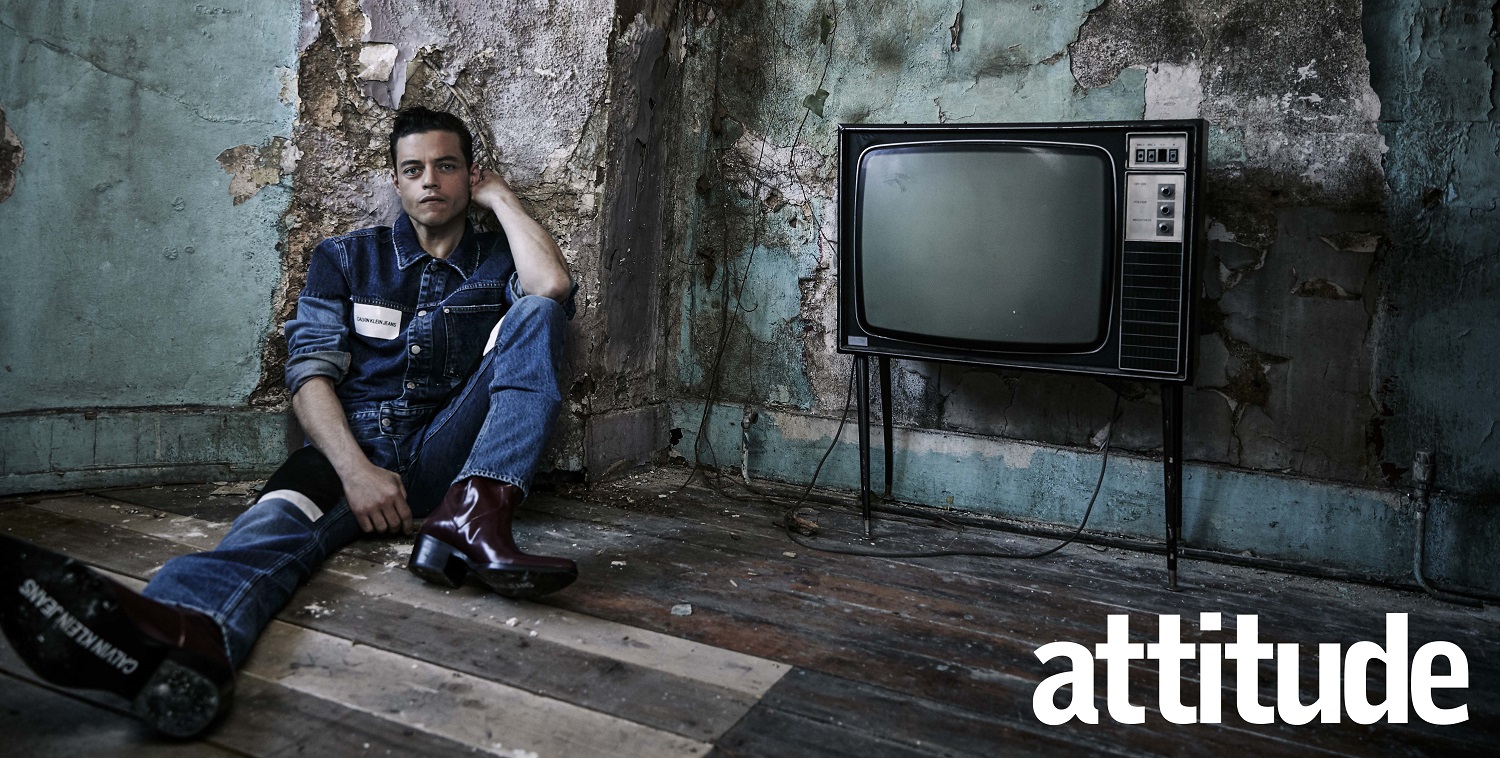
This article first appeared in Attitude issue 301, October 2018. Bohemian Rhapsody is now out in UK cinemas.
Standing in a run-down London building, actor Rami Malek realises he doesn’t need to be wearing the cardigan he’s been styled in for his Attitude October cover shoot.
He casually removes it mid-sentence to reveal a figurehugging white vest. Rami, we soon discover, is intoxicating. As the lead actor in the forthcoming Queen and Freddie Mercury biopic, Bohemian Rhapsody, we’re already won over.
In real life he’s charming, thoughtful and polite. He smells of sandalwood, although he can’t recall the fragrance. Consider us sold.
When we meet Rami, he’s little more than 48 hours away from completing work on the film — noting that two days earlier they did some pick-up shots (“piano gaps” from the Live Aid scenes, fact fans. “A little bit off.”)
He’s still very much in the head space of having played the legendary singer in the first official film about the Queen front man, who died from an Aids-related illness in November 1991, at the age of 45.
Once the shoot wraps, the actor — best known for his leading role in Mr Robot and as “Snafu” Shelton in the Steven Spielberg-Tom Hanks WWII-set mini-series The Pacific -– is once more fully-clothed.
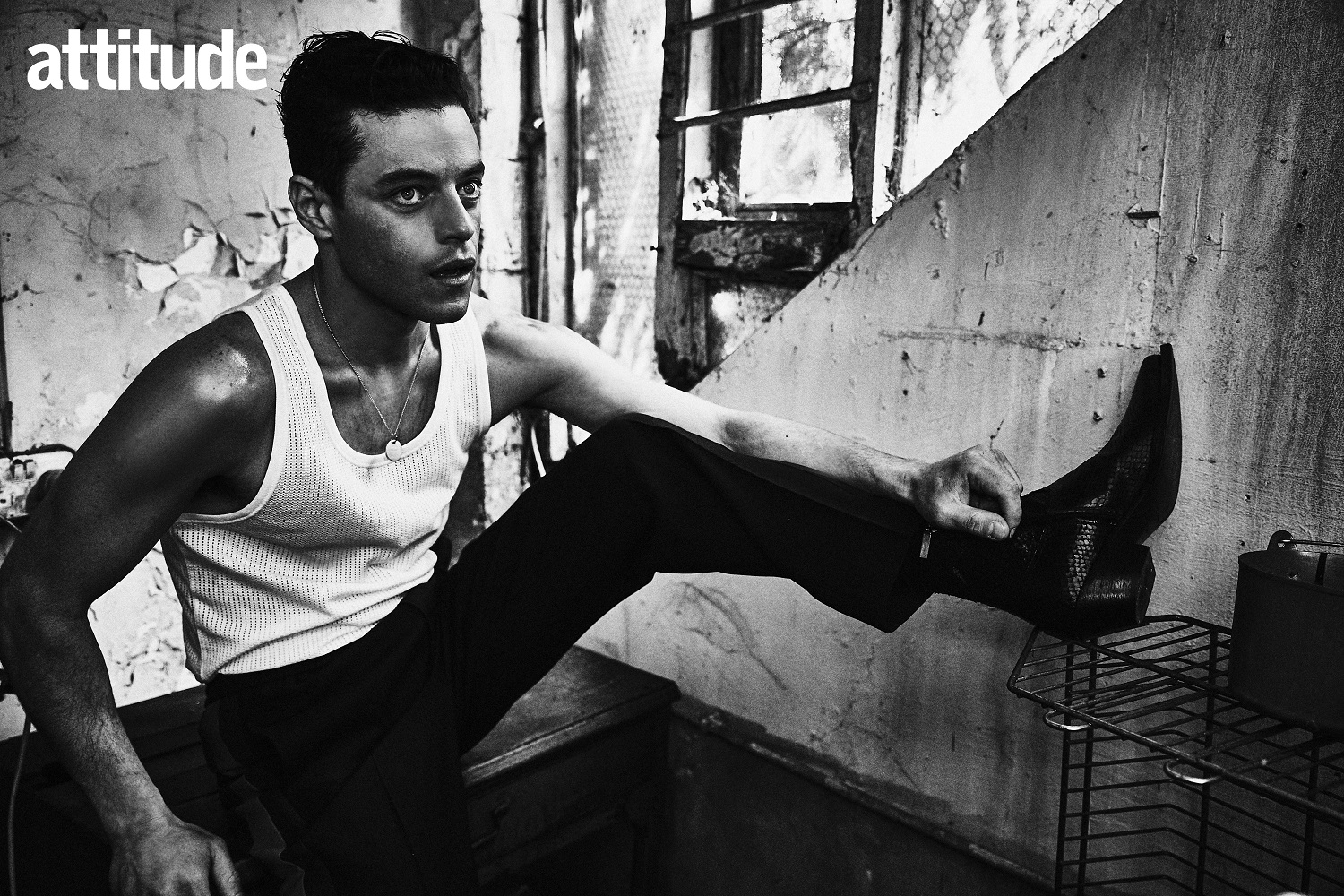
And there’s one slight difference from seeing him on our set, and in scenes from Bohemian Rhapsody. Rami’s not rocking that otter look… “Let’s say the chest hair is all mine, that’s the best I could do,” he grins when asked how much help he had from makeup in that department.
“At times I can grow some facial hair.”
It becomes increasingly obvious throughout our conversation that the project has had a deeply positive effect on 37-year-old Rami.
The first thing he says when asked about film is: “It was one of the most rewarding experiences of my life.” He pauses and thinks for a while, as he does often throughout our conversation, clearly searching for the best words to carefully describe his passion, but also to ensure nothing can be misconstrued.
“Being fortunate enough to have the chance to play one of the most remarkable musicians of our time is something that will be lasting for anyone who endeavours to take on that challenge,” he adds.
“I grew up quite a bit during filming and the rehearsing and seeing it all the way through to the end. Freddie had an impact on me, as you would imagine he would anyone.”
The film has been a decade in the making — rumours of different variations, including one where Freddie dies midmovie, have been firmly debunked, and producer Graham King recently denied rumours of other casting.
When executive producer Denis O’Sullivan found Rami, the search was over. And it’s just as well, because once you see him on screen you’ll realise there could be no one else to play this part.
Rami is, quite simply, brilliant. “I don’t even know the history,” he says, explaining that at one point he’d told Graham that before realising it didn’t matter.
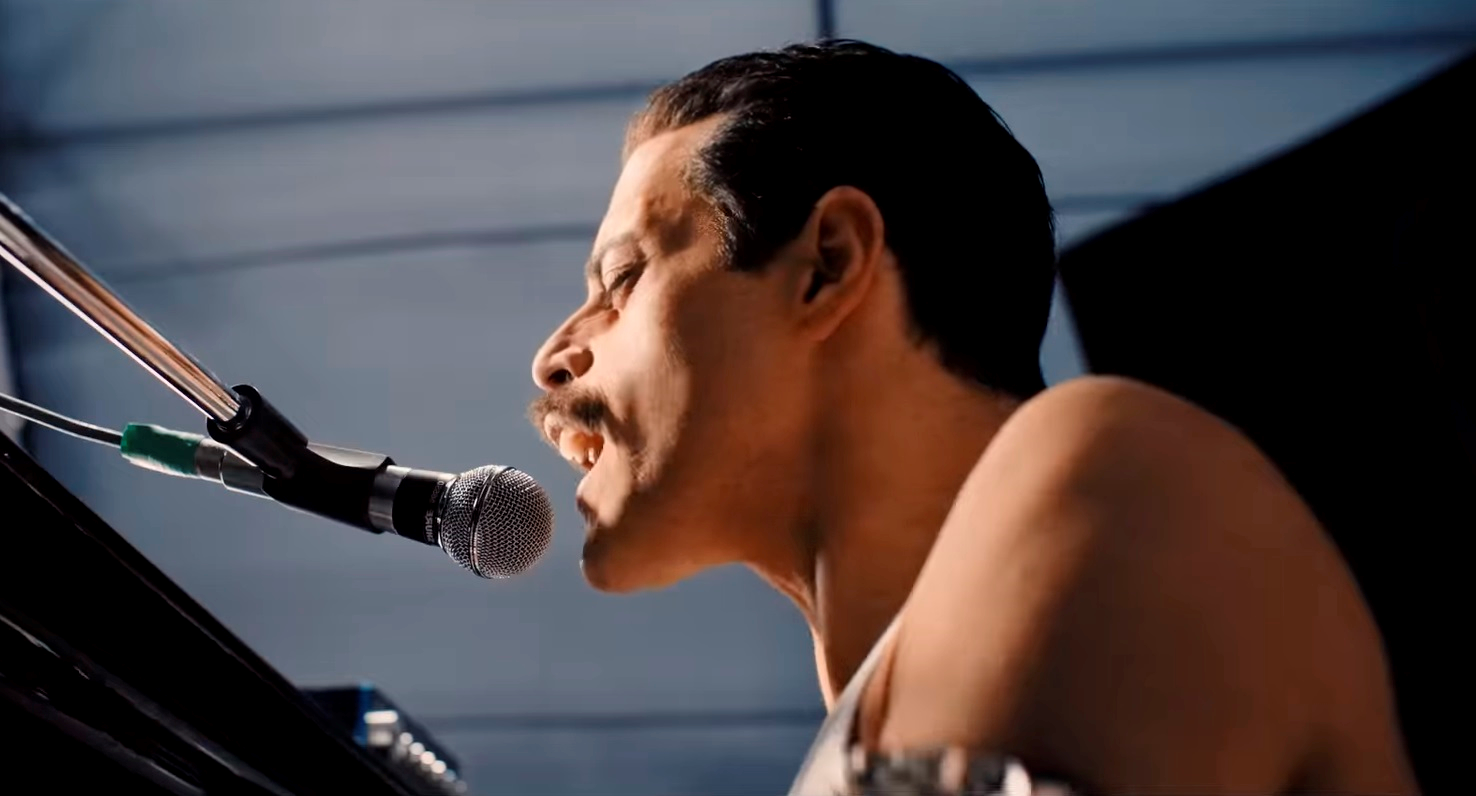
“In the spirit of Freddie, I just want to celebrate all things him. I’m not hung up on any of the negativity because what I’ve come to know is how remarkably special and beautiful that man was as a human being.
“He was a soul who’ll exist for ever. It does all of us a disservice to go back into the past and drudge up these, what you could call footnotes.”
We’re taking “footnotes” as our new dismissive term. And something else we need to banish as a footnote is the criticism that was levelled on — surprise, surprise – social media at the film’s first trailer.
People complained that Freddie’s story, as a gay man, was being “straight-washed” for Hollywood. “It’s a shame that people are making remarks after a minute teaser where you just wanna see the music. It’s difficult,” Rami sighs.
“First, let me say that I don’t think the film shies away from his sexuality or his all-consuming disease, which is obviously Aids. I don’t know how you could avoid any of that, or if anyone would ever want to.
“It’s a bit absurd that anyone’s judging this from a minute trailer. We know he was promiscuous, you see it in the film, but it’s not salacious and it’s not exploited.
“The idea is to celebrate this man’s remarkable life, his unbridled passion and zest for life. So that when you know the inevitable end is in sight, it makes you all the more conscious of how quickly beauty can disappear and be snatched from under you.”
Criticism is also, inevitably, levelled at having straight actors playing gay roles. And yet people will also still tell you there can be a hesitance to appear as a gay character.
But Rami is quite clear where he stands. “I’ve always come from this idea or maintained the rule that you are who you are. I don’t think anyone should be defined by their sexuality or the way they identify. What Freddie said was, ‘I’m just me. I’m me’.
“He never made a big fuss about who he was drawn to, or inclined to sleep with. He never made a fuss about his sexuality. He was a very private person and treated everyone in an equal way.
“That’s the way I look at life. I don’t look at roles in a way where I have to be heterosexual. That would be ridiculous. I don’t look at any director in a way where I would refer to a woman who was directing me as a ‘female director’ or a gay man directing me as a ‘gay director’.
“That all seems absurd to me. So why would I ever put myself in a position where I didn’t take a role?”
For those worrying, Freddie is quite gay in the movie. His friendship with DJ and comedian Kenny Everett (played in the film by actor and drag legend Dickie Beau) is included, and Aaron McCusker – Jamie Maguire in Shameless – plays Jim Hutton, Mercury’s boyfriend.
Hell, even Princess Diana makes an appearance.
What people watching the trailer, waving virtual pitchforks, aren’t taking on board is Mary Austin: Freddie’s girlfriend.
He referred to Mary as his common-law wife, even bequeathing his home to her in his will. “Essentially, I would say [she was] his soulmate. They just had this infinite understanding for each other.
“It’s something you have to address, the way you have to address his sexuality in the film. You also have to address the six-year relationship he had in which he proposed to a woman,” Rami says.
There’s something else that the makers of the film felt they had to address, despite the timeline of real events meaning they didn’t necessarily have to.
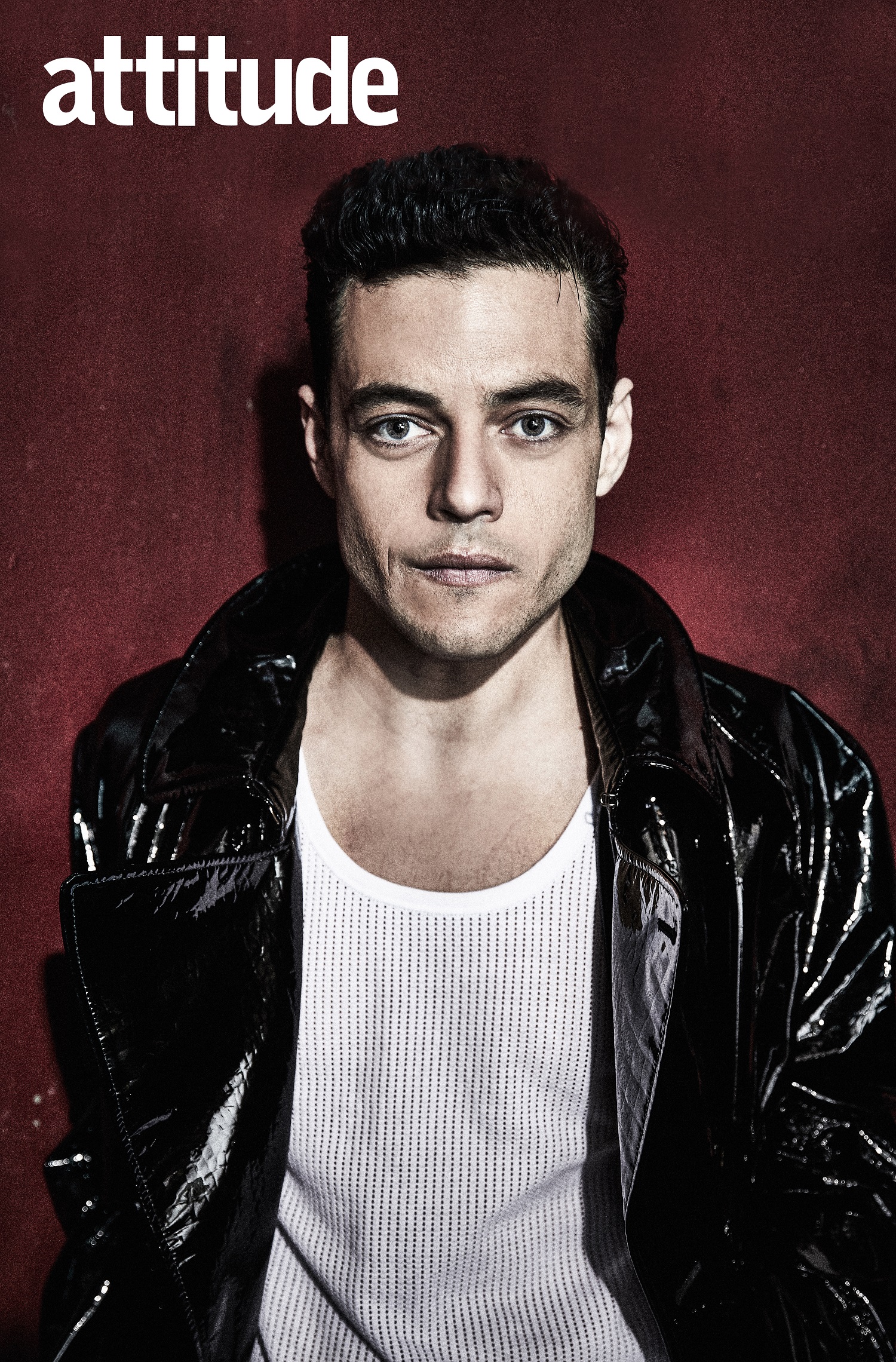
Sources state that in 1986 the press, desperate to prove Freddie had HIV, reported that he’d taken a blood test — something he consistently denied.
But let that sink in for a second: something as simple as a blood test was reported as news as recently as 1986. Hutton, who died in 2010, said Freddie was diagnosed in April 1987, with Queen guitarist Brian May having said members of the band were only told “shortly before he died.”
The film builds to the band’s stunning performance at Live Aid in 1985 and includes a moving scene where Freddie reveals his diagnosis to the band, while talking about “not wanting to be the Aids poster boy.”
So, did the members of Queen discuss how this was handled?
“The guys did tell me. They did, yeah,” Rami says quietly. “I wouldn’t want to speak about that without talking to them first. When you have a moment like that, I wouldn’t want to infringe on it. It’s a sacred moment.
“The film is not an exact timeline,” he continues. “We play with it in order to maintain a really great drama.
“We talked to Brian and Roger [Taylor, the band’s drummer, who is played by Ben Hardy] about altering things that happened in the scope of a two-hour film.
“It’s a finite amount of time that we’re telling a story in and a finite amount of the story that actually exists in time.
“They treasure this man as their dear friend and brother. And I’ve come to treasure him in my own way as well.”
Given that Freddie’s illness became a part of Freddie Mercury’s story — publicly, at least — in later years, did Rami feel it was important to include it in Bohemian Rhapsody?
He takes another long pause before answering. “The film needed to approach it in a delicate manner,” he eventually continues, “you can’t shy away from it. It was an important moment to have in the film, one that ultimately is very sad but also empowering in a way.
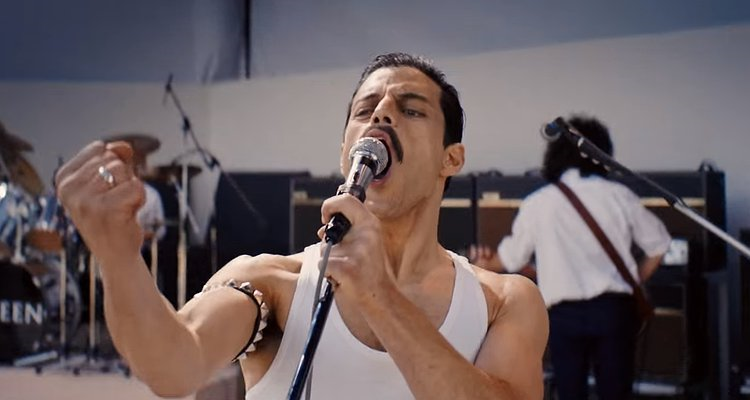
“It shows you just how resilient human beings can be and how much we rely on the strength of our friends and family to get us through tough times.” Rami’s voice cracks and he seems elsewhere. #
“It’s something about his character in being able to stand there and say those things that is just pure Freddie Mercury. Just to allow his spirit to shine, even in the darkest of circumstances is something that is hopefully as uplifting as it is sad.
“This pandemic is still very much a horrific threat to so many people in the world. It exists as a reality for so many that I think it would be a shame not to address it.
“Brian and Roger created a charity, The Mercury Phoenix Trust, now we get to be a part of that in some way. This investigation of Freddie’s life has opened me up to realising that we all have more to do in the world other than just telling stories.
“Of course, it’s my passion and love, but I want to do everything possible now to bring more awareness about a horrific disease that still exists in the world, and make every attempt to help eliminate it.”
The tragedy of Freddie’s death is something that exists in counterpart to his joyful love for life.
So, is he still living a bit of the rock-star life?
“After shooting some of the concert footage — a pretty big adrenaline high — you understand why it’s difficult to go home and straight to bed after that.
“Acting, in and of itself, is very adrenaline-fuelled at times. And then to layer on a stage performance.
“The concert within the film is even more heightened. I’m never going to compare myself to a rock star, I’m just an actor, but you do feel the rush.”
Quite a long time passed between Rami landing the role of Freddie and actually taking to the stage for this career-defining moment.
It was during a press trip for the second season of Mr Robot, in early 2016, that he flew to LA. It was there he had the conversation that was going to change his life.
“I met with Graham King and Denis O’Sullivan, the producers who had the rights to the film, they brought me in and pitched the idea of me playing Freddie.
“I was being considered. I just didn’t realise that at the end of the day they were seeing me as their choice to play this role. With things being as fickle as they are in Hollywood, I kinda took it with a grain of salt.”
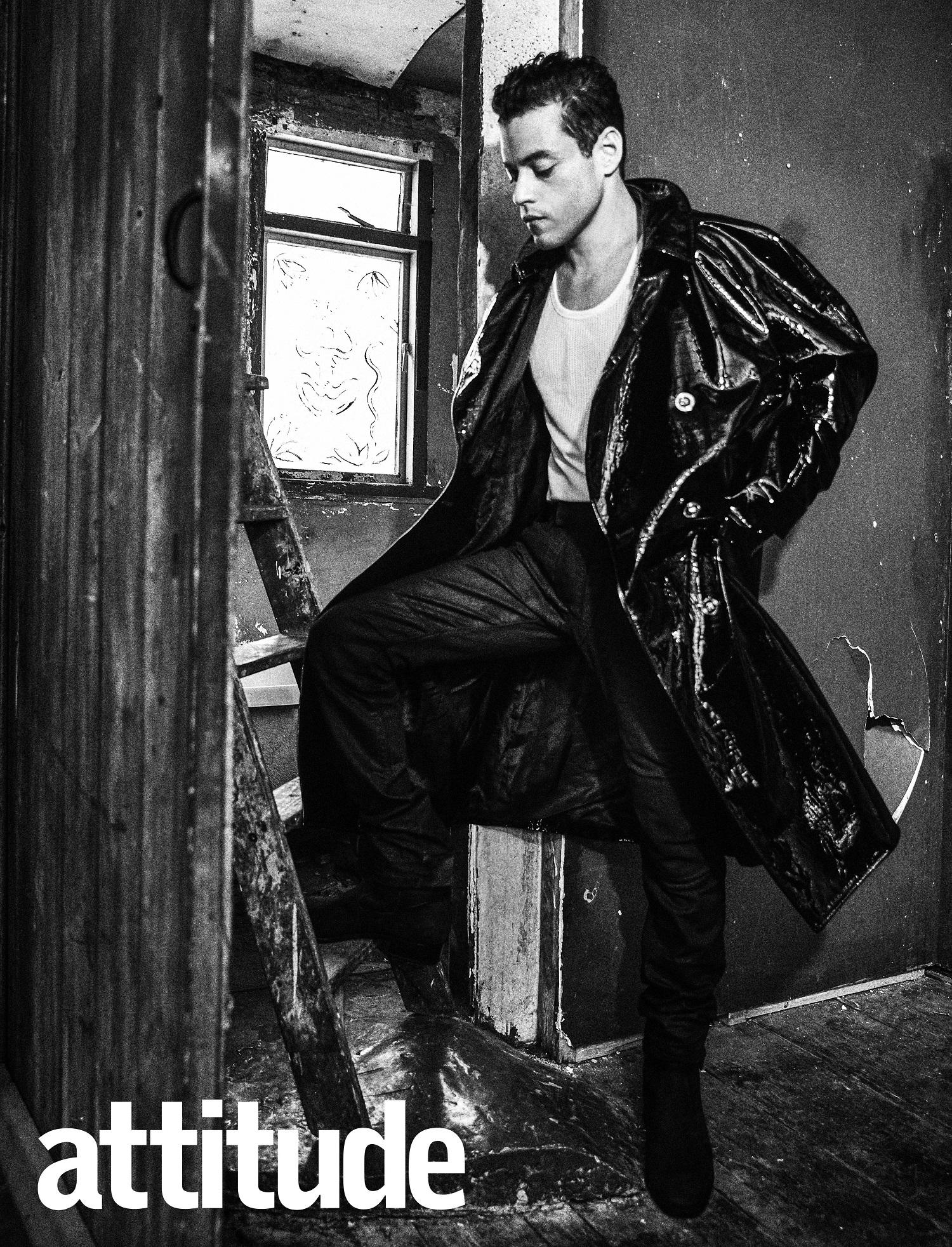
That grain was all he needed though, and he didn’t waste time in running with it. “I did not put myself in a place that was so far removed that I couldn’t constantly immerse myself in things – in him, and all things Queen – in case it did go my way,” he elaborates.
“So, I began preparing for it two years prior to shooting, just in case. Then I did Papillon [playing the role made famous by Dustin Hoffman in the 1973 original] with Charlie Hunnam and he and I aged throughout it.
“The make-up designer had to make moulds for us to make our teeth look more and more decrepit as we got older. I got fitted for a new set of teeth and that’s when I had this idea in the back of my head.
“I said: ‘Do you have my teeth mould?’ and she said yes. I showed her a picture and asked: ‘Can you make me these?’ It was a picture of Freddie.
“She laughed, and within a week I had the teeth. I was still not convinced that I was going to play this role, but every night I’d put [the teeth] in just to kind of get used to physically being closer to him somehow, and working from that frame of reference.
“It was quite some time before I actually knew that I was the guy, that my deal was locked. I still had to get the approval of [Brian] May and [Roger] Taylor but just had to be as prepared as possible.”
Rami adds: “I flew to London, and immersed myself here before I knew anything at all.” Wait. Hold up. Go back a second — he was literally getting his teeth into the role?
But playing someone who’s real, who’s extremely well-documented, that must require much more preparation as an actor?
“I was very self-aware from the onset that I was never going to portray Freddie Mercury as he was, with all of his idiosyncrasies, charisma. I will never exactly be this man,” Rami continues.
“All I could do was make as strong of an attempt as possible to capture his essence. To understand his make up, his identity and find a window into his soul.
“I just had to remove myself from that kind of ‘monkey on your back’ that you have to be Freddie Mercury.
“No one will ever be Freddie Mercury, there will only ever be one. I just wanted to possibly open up a window to what his story was all about.”
Rami explains that he surrounded himself with people who could help him achieve his goal, to understand the complicated life that Freddie had.
Raised in Zanzibar (now Tanzania), Freddie went to boarding school in India. Fleeing a revolution, he became, essentially, an immigrant in London. “So not a real sense of home,” Rami considers.
“Through the course of some years, discovering how he identified as a man and sexually, and in his life in so many ways — the way he loved and the way he existed. It was a constant search, as we all do.
“That was the way I could hook into it.”
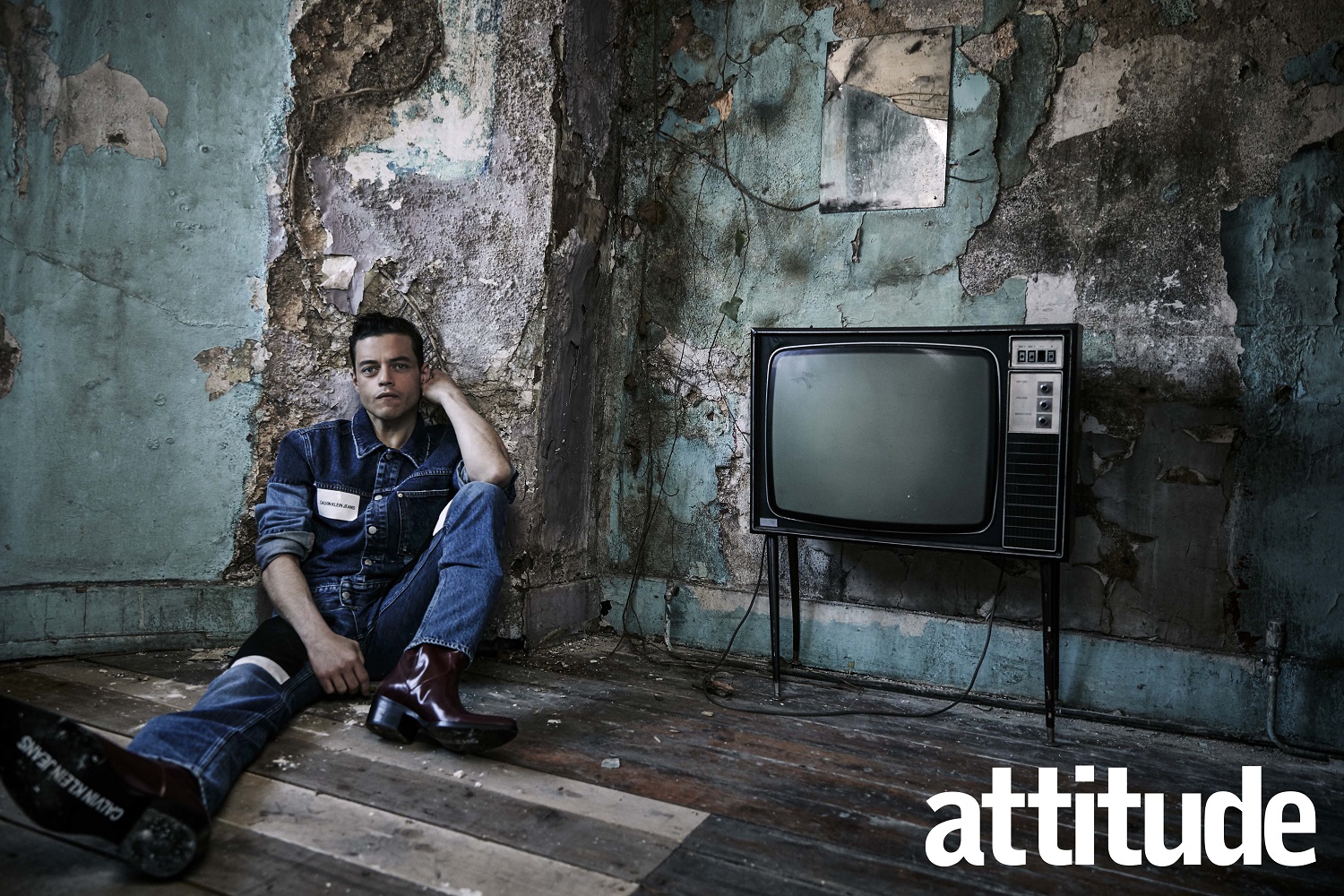
Rami worked with a movement coach, auditioning candidates and eventually settled on Polly Bennett. They threw themselves into research.
“You can see that Freddie watched the film Cabaret a number of times,” he laughs. “I would sit around and watch Liza [Minnelli] do her thing and say: ‘There it is, that’s that little elbow thing, there’s a little [director] Bob Fosse there’.
“To understand Freddie, I looked at his icons and heroes. We’d constantly be trying to do David Bowie poses, or rock out like Jimi Hendrix, or do something in the style of Liza and Bob Fosse.
“That was the real joy of it all.” Along with Polly, Rami was surrounded by the best to transform into rock’s greatest showman. William Conacher was his dialect coach, Jan Sewell – who worked with Eddie Redmayne on The Theory of Everything – was the make-up designer, and Julian Day, who’d worked on the Joy Division movie, Control, was on costuming duty.
“He’s going on to do Rocket Man, the Elton John film,” Rami grins. After having embodied this life, and having lived within an element of it, how much of Freddie can he now relate to?
“So very much,” he says firmly. “I’m a first-generation American. My parents went to the US seeking a better life.
“I could say that I felt a bit of a misfit myself. You know, trying to figure out his way in the world.
“The beauty of Freddie Mercury is that we can all relate to him, in a sense of not exactly knowing at a young age who we fully are and where we’re supposed to go.
“Wanting to do something special and wanting to connect with other human beings. What’s miraculous and marvellous about him — maybe the most remarkable thing – is how he can reach you as a human being, how he can identify with you, whether it’s oneon-one or the person right at the back of an arena who feels they don’t belong.
“Even through a radio, he’ll getcha. He’ll snatch you up and make you feel all right.” Talking about making us feel all right, we need to know if they recreate the legendary video for the 1984 single ‘I Want To Break Free’, featuring Freddie in drag.
After some coaxing, Rami reveals they did film it.
“It was a shitload of fun. I wish it was extended. I don’t know what the final cut of this movie is going to be like. But I did get to vacuum.”
He won’t be drawn on any spoilers for the movie, so instead we enquire if that was his first time in drag.
“I’ll leave that to everyone’s imagination,” he answers coyly. But it’s by no means the only flamboyant look he gets to rock in the film.
“The white satin fan look that Freddie and Bryan both wore in the mid-1970s, that was quite fun,” he says of a Zandra Rhodes design. “I got to twirl around in that on stage.
“The camera captures that beautifully. She was very aware of what would photograph well, as Freddie — as you guys say — minced. Right? I learned that here. Mincing about?” How VERY dare you Rami!
But seeing as we’re talking about moments on the camper spectrum…
“The most camp? I’ll tell ya! The most outrageous was trying on the clothes for the first time in all the costume fittings.
“I probably had something around 50 hours of costume fittings, which for some actors would be a nightmare.
“But it was a way of creating, experiencing the most bold movements and outrageous things I could say, in the spirit of trying on some fabulous clothing and trying to shine in them.”
Did he keep anything? “A few things. I have an FM-embroidered hand towel,” he smiles. “But the experience and the memories, they are indelible.
“I will take them with me as long as I have the pleasure of waking up on this Earth.”
It sounds, if we might be so bold, as though working on this movie has changed him.
“How could it not?” he shrugs. “It has. I feel fortunate to have some tiny corner of a window into a man who I hope I can get to share with anyone who gets to see this or listen to his music, or watch a documentary about him.
“It’s nice for people for his spirit to live on in any way. He obviously doesn’t need my help in any way, shape or form, but being a part of it is an extraordinarily special experience and I’m humbled by it.”
Bohemian Rhapsody is in UK cinemas from today. Watch the trailer below:
